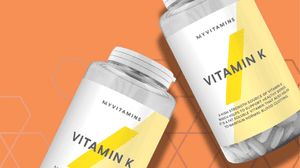
Vitamin C is an essential nutrient which plays a part in cell function, immune health and more. (1,2) But exactly how much do we need and why? Here’s an introduction to vitamin C.
The Benefits Of Vitamin C
Vitamin C, or ascorbic acid, is most commonly known for its impact on immunity. However, this nutrient has a variety of other benefits:
Increases Iron Absorption
Research shows that vitamin C locates non-heme iron and stores it in a form easily absorbed by the body. (3) Iron is heavily involved in the transportation of oxygen (4) and the formation of red blood cells. 5
If you're looking to boost your iron levels, try Myvitamins Iron & Folic Acid Tablets. They're formulated with vitamin C and A.
Maintains Brain Function
As an important antioxidant molecule in the brain, vitamin C impacts cognitive health and neurotransmitter synthesis. (6) As a result, low levels of vitamin C mean our psychological function is compromised, impacting our ability to complete daily tasks.
Fights Fatigue
A recent study showed that intravenous supplementation of vitamin C reduced tiredness of subjects in two hours. The effect lasted for one day. (7) In addition to reducing feelings of fatigue, vitamin C is also proven to support a normal energy yielding metabolism, (8) making it a must-have addition to your daily routine.
Supports Collagen Formation
Vitamin C supports the healing of connective tissues. This nutrient supports collagen formation within our skin, joints, bones, blood vessels and more. (9) Our natural collagen levels decline as we age, which can affect our skin elasticity and joint flexibility. Increasing our vitamin C intake can help to boost our levels of this natural protein.
Find out more about collagen in our blog post:
Vitamin C Deficiency
According to the NHS, adults need 40mg of vitamin C per day. Without this, you are likely to develop a whole host of symptoms, including:
Dry skin
Poor wound healing
Bleeding gums
Difficulty fighting off infections
Joint pain
Our bodies can’t store vitamin C, meaning our daily intake must come from our diet. You can find it in citrus fruits and green vegetables including brussels sprouts and broccoli.
Supplements are a convenient way to support your natural vitamin levels. Myvitamins Vitamin C Powderis a great option which can be added to shakes, drinks and foods. Alternatively, our Multivitamin Gummies are a delicious source of over 10 essential nutrients, with 40mg of vitamin C per gummy.
Vitamin C is just one of the vital vitamins we need in our diet. Shop the rest of our Essentials range here.
- Vitamin C contributes to the protection of cells from oxidative stress.
- Vitamin C contributes to the normal function of the immune system.
- https://www.healthline.com/nutrition/increase-iron-absorption#TOC_TITLE_HDR_5
- Iron contributes to normal oxygen transport in the body.
- Iron contributes to normal formation of red blood cells and haemoglobin.
- https://www.ncbi.nlm.nih.gov/pmc/articles/PMC2649700/
- https://www.ncbi.nlm.nih.gov/pmc/articles/PMC3273429/
- Vitamin C contributes to normal energy-yielding metabolism.
- https://www.ncbi.nlm.nih.gov/pmc/articles/PMC6204628/#:~:text=Vitamin%20C%20has%20an%20essential,prolyl%20hydroxylase%20and%20lysyl%20hydroxylase.&text=These%20enzymes%20catalyze%20the%20hydroxylation,stable%20collagen%20triple%2Dhelix%20conformation.








